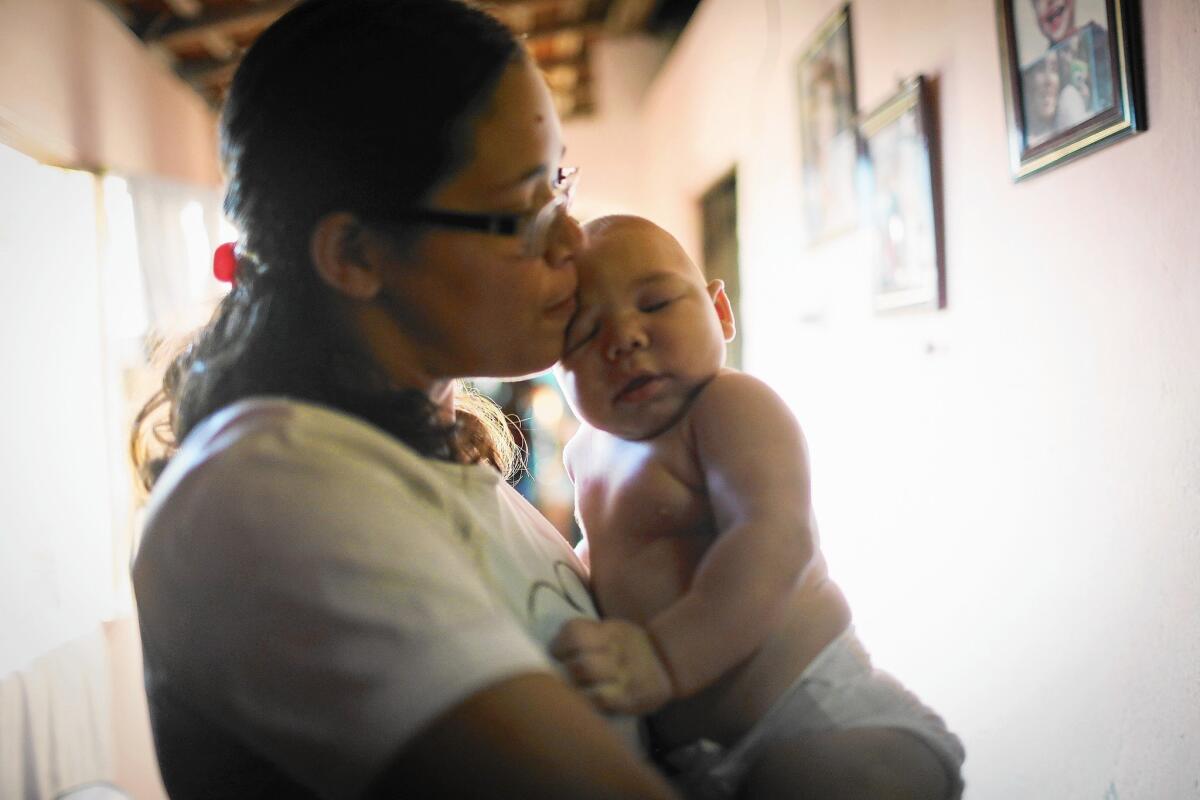World health agency expects Zika virus, linked to birth defects, to reach U.S.

- Share via
reporting from SAO PAULO, Brazil — For Gleicy Oliveira, the public health warnings about the Zika virus came too late.
Her son, Guilherme, was born in October with a severe birth defect known as microcephaly — “small head” — that has been linked to the mosquito-borne virus now spreading through the Americas.
------------
FOR THE RECORD: In the Jan. 27 Section A, an article about the spread of the Zika virus in Brazil misidentified the northeastern state that is home to Gleicy Oliveira, whose newborn son was affected by Zika. It is Rio Grande do Norte, not Rio Grande do Sul.
------------
“It was only after he was born and swiftly taken away from me for emergency treatment that we understood that it was Zika,” Oliveira said.
See more of our top stories on Facebook >>
This week the World Health Organization said the virus is likely to reach the United States and all the other countries of the Americas except Canada and Chile — every place that has the Aedes mosquitoes that carry the virus. Pregnant women have been urged to take precautions to avoid mosquito bites.
The best way to avoid microcephaly is not to get pregnant, and the government in El Salvador took the unprecedented step of advising the population to put off having children for two years.
In Brazil, the country hardest hit, health authorities said they plan to deploy 220,000 members of the military on a single day in February to distribute pamphlets across the country to educate people about the risks posed by mosquitoes.
“We know perfectly well that we will only be victorious in this fight if we count on the contributions of our people,” Health Minister Marcelo Castro told reporters this week.
He was critical of the country’s past efforts to control mosquito-borne illnesses: “We’ve had the mosquito here in Brazil for three decades and we are losing badly.”
The U.S. Centers for Disease Control and Prevention has already warned pregnant women against traveling to Zika-affected regions.
Cases have been identified in the continental United States, including in California, but transmission is thought to have occurred outside the country. U.S. health authorities are monitoring for Zika in mosquitoes and people and at some point could advise pregnant women to stay inside or sleep under insecticide-treated bed nets.
NEWSLETTER: Get the day’s top headlines from Times Editor Davan Maharaj >>
Although the virus popped up in Africa during the 1950s, and later in the Pacific Islands, including Micronesia, it had not been seen in the Americas until it appeared in Brazil in May.
It unclear how it got there. One theory is that the virus entered the country during or around the 2014 World Cup, when hundreds of thousands of people were visiting from around the globe.
Weather conditions may be contributing to its spread, some experts have suggested. “Maybe El Niño has something to do with the rapid spread, although we aren’t sure,” said Dr. Peter Hotez, dean of the National School of Tropical Medicine at Baylor College of Medicine in Houston.
The lack of any previous exposure has also increased vulnerability because the populations lack immunity. Hotez said that big mosquito populations make the U.S. Gulf states susceptible, and high poverty rates in places such as Haiti and Jamaica make prevention more difficult.
Zika, which is related to dengue, yellow fever and the West Nile virus, can cause fever, rash and pain. But for pregnant women, the danger may be much greater.
Until the current outbreak, the virus had never been linked to birth defects. And although there are other causes of microcephaly — including chemicals, bacteria and radiation — the evidence is now strong enough to merit public health warnings.
Researchers at the Oswaldo Cruz Foundation in Brazil have recently found that the Zika virus can pass through the placenta from a mother to a fetus, the public health research organization said.
Nearly 3,900 cases of microcephaly have been reported in Brazil since the first known Zika transmission there in May. The brain abnormalities that are part of the condition can cause severe developmental problems or death. The fatality rate is unknown.
The highest concentration of cases is in the relatively poor and hot Northeastern region, which includes the state of Rio Grande do Norte, where 31-year-old Oliveira lives.
Her son was one of the three babies born with the defect in the same hospital on the same day, she said.
“I was desperate to understand everything about what could have caused this,” she said.
She now runs a Facebook support group for mothers in her state with microcephalic children. They organize meetings and share media reports and inspirational stories from women whose afflicted children have survived into their teens. The group has rapidly grown to more than 1,600 members.
“Some children affected with microcephaly die right away,” Oliveira said. “Some live for a while, and some live for a long time. Right now, Guilherme has a great life and it will continue to be great.
“The hardest thing is not knowing if he will walk, if he will talk,” she said. “I don’t even know if he’ll be able to chew.”
Bevins is a special correspondent.
ALSO
In Mumbai, club weddings call for grand receptions
Bangladesh reeling after second wave of attacks possibly tied to Islamic State






